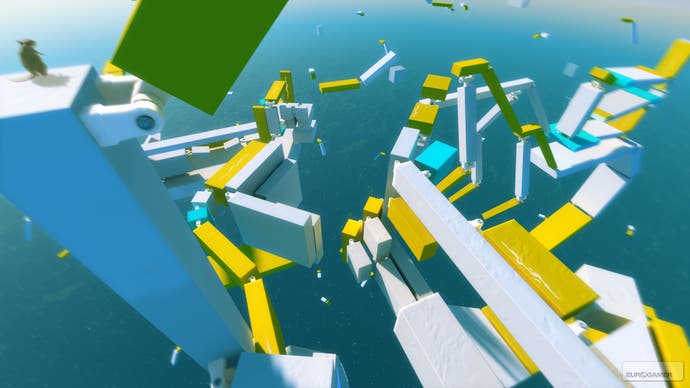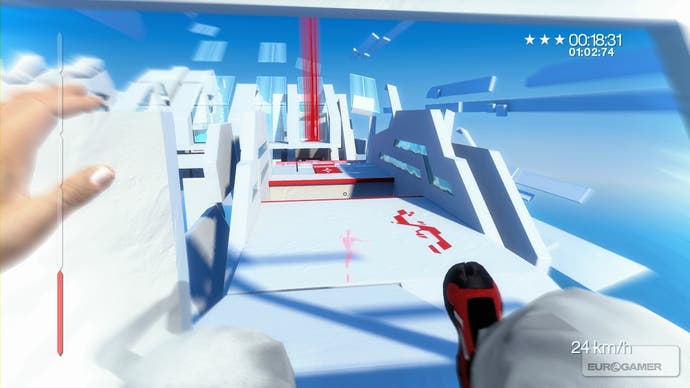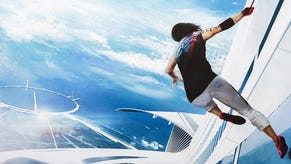Mirror's Edge Pure Time Trial Pack
Have more Faith.
At its absolute best, Mirror's Edge transformed bloated, couch-weary gun-lovers into rooftop ballerinas, ennobling those usually-enfeebled and seldom-even-rendered first-person appendages - your character's legs and hands - with the elegance and precision of Super Mario, and not just any Super Mario, but the Super Mario of perfectly vaulted piranha pipes, crouched slides beneath anonymous coin-bearing bricks and perfect, fortress-tall finishing-line breakthroughs. It's little wonder that Faith, pointedly envisaged as a plain-chested spokesrunner for forgotten delight, has already been re-imagined in 2D.
But for many, the game's short campaign and recycled time trial routes were insufficient to bridge the gap between imagination and reality. Elegance was elusive, with precious little time to accumulate experience before the choking urgency of the obnoxiously basic narrative and paralysing combat knocked you back off your feet - tautological clutter in the light of which the smog-free clarity of the game's brilliantly sun-baked play areas felt like something of a cruel joke. It clearly wasn't the punch line DICE had in mind either, because the Pure Time Trial Pack - available for about seven quid on Xbox Live and PSN - is nothing less than a carefully worded apology. I totally accept.
Made up of seven new maps (with two substantial deviations making nine separate tracks), the Pure Time Trial Pack sends you back to school, and this time you really fancy teacher. The first level, Chroma, sets out the pack's stall with a mixture of simple vaults, slides and wall-runs, paying out with a few more reclaimed seconds as you throw in turning jumps and wall-springs, and adjust to ramps and lines that nurture momentum. It's difficult, but 90 seconds should be achievable within a couple of runs if you spent more than a few hours with the main game, and there isn't an air vent, ventilation unit or pipe jungle to be seen. Even the red doors are gone, but you won't realise until someone points it out, even though you really liked them.

Then it's onto Flow, and, not for the last time, a radical change in character if not pace. Flow wants you to tease every last pace out of wall-runs to inch closer to faster slopes, which sing to your screeching rubber soles like a choir of WipEout-fused SSX references, before you clamber through gantries at the foot of the run in a spiral of rebounding wall-springs, arcing wall-runs, dips and dives to a finishing line submerged beyond banking steps.
Like the red doors, the red-equals-optimal despotism of the main game's guiding force is gone from the Pure pack's Day-Glo pleasure parks, deposed by Designer's Republic squiggles daubed to suggest certain moves intuitively. Your language of movement may by now be uniform - and hopefully fluent, at least in the basics of Faith's death-defying lexicon - but by the time you reach the likes of Razzmatazz, Velocity and Actino, the platforming is a blur of competing dialects, as horizontal bars whisper suggestively in your peripheral vision while other, more obvious routes cry out to be augmented and, at last, experimented with. You can combine things in ways the host game seldom accepted or invited, despite its pretence.
And it's beautiful. Hinged blocks dangle across the sky like a children's train set thrown across washing lines; curved glass is hung beneath cool, red and white eyebrows of solid ground like Ray-Bans in the sun; and the sinister, green-yellow floating cubes of the hectic (and slightly malignant) Kinetic track beg to be parsed by the chattering, split-toed plimsolls you keep swinging up to your chest to avoid perilous snags, even though each of the tracks has seemingly been designed to avoid the original game's worst excesses, like barbed wire and electric fences.

Without the context of streets below - just a gaping, oceanic abyss - depth perception sometimes abandons you in the face of leaps into space, as does your spatial awareness when the levels occasionally tighten into hard, nondescript blocks, but with runtimes seldom in excess of two minutes after a few practice runs, and newfound clarity of focus, your sense of direction is only fleetingly problematic, and overruled by the desire to improve. These levels want to be played, and you want to play them, not least because you never have to bloody well kick anyone in the head or track down Top Cat or listen to Merc rabbit on about 'blues' from his rooftop burrow.
And for those who really want to push it, the Pure Time Trial Pack can be hard. Getting to the end of the finisher, Reflex, and its follow-up Reflex Redux, is impressive enough, but to conquer these stages and take away three-star ratings will require experimentation, invention and focus. The new Trophies and Achievements (accounting for 250 Gamerpoints in Xbox 360's case) are daunting, insisting on elaborate chains and massive star totals. If someone on your friends list has the full 1250G, their fingers are worth calling on if you ever tangle your hair in an outboard motor. PS3 owners too, and they even get an exclusive, free map.
Mirror's Edge wasn't for everyone, and the Pure Time Trial Pack doesn't change that. But it's not only for people who loved Mirror's Edge; it's also for people who almost loved it, or perhaps only half-liked it. These levels are more imaginative, varied and inspiring than anything in the original game, stripping away the clutter to deliver something I'd half-expected not to see until the presumably nascent sequel leaps from the drawing board into the disc tray. This is a new high watermark for premium downloadable content, crowning an already memorable game with the wisdom of hindsight. The Faithful have been rewarded.




